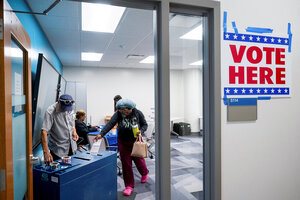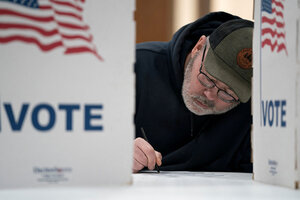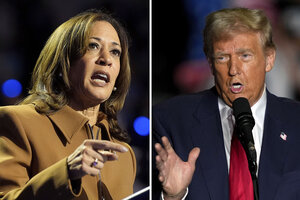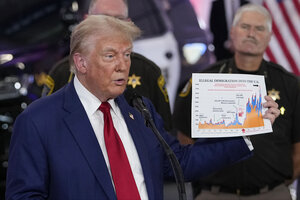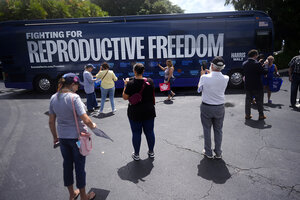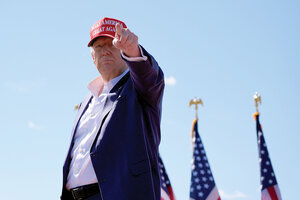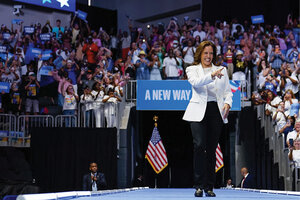Will the 2024 election results be accepted by all? Wisconsin is a key test.
Loading...
| Milwaukee
Four of Wisconsin’s last six presidential contests were decided by less than a percentage point, making it a perpetual – and crucial – battleground state.
Recriminations from 2020 cast a long shadow here. Republican leaders feuded with both supporters and Democrats over how to handle then-President Donald Trump’s claims of a rigged vote after losing to Joe Biden by fewer than 21,000 votes. Recounts, audits, and court cases found no significant evidence of electoral fraud, but failed to quell the distrust among many Trump voters.
As Wisconsin gears up for another presidential contest involving Mr. Trump, election officials are braced for what could be a bumpy ride. Holding an orderly election with results accepted by all is particularly challenging in a state deeply divided politically and socially. That makes Wisconsin a microcosm of a broader struggle to restore confidence in a bedrock of U.S. democracy: the casting and counting of votes.
Why We Wrote This
A story focused onRestoring trust in elections in the wake of the contentious 2020 vote is a pressing challenge in battleground states like Wisconsin. Part of a series on the issues that may tip key swing states: Arizona, Georgia, Michigan, Nevada, North Carolina, and Pennsylvania.
Like other states roiled by Mr. Trump’s allegations, Wisconsin has seen partisan jockeying over the rules governing elections, particularly for mail-in ballots, whose use soared in 2020. In Georgia and Nevada, GOP legislators have since tightened the rules for voting by mail and in person, and made it easier to challenge voter registrations, among other changes. By contrast, Wisconsin Gov. Tony Evers, a Democrat, has vetoed GOP election security bills.
Proponents of GOP-authored electoral reforms say they will prevent fraud and ensure that all legal votes are counted properly; critics say the aim is to suppress votes for Democrats and lay the groundwork for postelection lawsuits. Mr. Trump has said he will win unless Democrats cheat, and repeatedly voiced concerns about election interference or “rigging.” In a recent CBS interview, he said he would accept the outcome of a “free and fair” election, which he defined in part as counting votes and not changing rules and regulations without proper authority – adding that a lot had been done over the past four years to address “problems” in the last election.
For months, Mr. Trump and the Republican Party have poured resources into election integrity programs to monitor voting in critical states in November. The Republican National Committee said in June that it aimed to recruit 100,000 volunteers as poll-watchers – double its goal four years ago.
Former Wisconsin Gov. Scott Walker, a Republican, says it’s important to be prepared for poll-related disputes: “After the election, it’s like spitting in Lake Michigan,” he quips.
But he sees little upside in rehashing fraud allegations from 2020, reflecting an intra-GOP split over how best to ensure victory. “If you have concerns about past elections, focus on winning this one,” he says.
A complicated farm state, now roiled over vote “fraud” and audits
Wisconsin has a proud tradition of self-governing and building social programs under leaders like Robert La Follette, a GOP progressive from the early 1900s known as “Fighting Bob.” It’s also a farming state steeped in ideals of personal responsibility, and was the birthplace of the Republican Party in 1854. These traditions, which coexist somewhat uneasily, have become a source of greater turbulence since Mr. Walker’s 2010 election.
He pushed through landmark legislation that rolled back organized labor’s collective bargaining rights and workplace representation. Democratic resistance to this legislation and a tumultuous recall election that Mr. Walker won in 2012 only deepened partisan divisions.
That split is on full display in Washington, says Anthony Chergosky, a politics professor at the University of Wisconsin-La Crosse. “I don’t know that there is a stranger combination of U.S. senators in the nation than Ron Johnson and Tammy Baldwin,” he says. Mr. Johnson, a Republican, is an outspoken Trump ally; Ms. Baldwin is a Democrat who was the Senate’s first openly LGBTQ+ member. She faces a Republican challenger in November.
After Republicans redrew Wisconsin’s electoral boundaries to partisan advantage in 2011, Democrats were effectively boxed out of state policymaking. When Mr. Evers, a former schools superintendent, was elected as governor in 2018, Democrats won the popular vote but couldn’t break the GOP’s hold on the legislature. The result has been a power struggle in the statehouse.
This standoff, and a sense of dysfunction in state government, fed public mistrust in 2020 when Wisconsin held a pandemic election. The rules on who could cast a mail-in ballot were relaxed by the bipartisan election commission in ways that GOP critics called unjust. That criticism then became a rearguard fight to stop Wisconsin’s 10 electoral votes going to Joe Biden, a fight that has never really ended.
“The results should never have been certified. There was pure unadulterated fraud,” says Jefferson E. Davis, a Republican activist.
This “fraud” included the completion or correction by municipal clerks of address information on absentee ballots, a practice known as “curing” ballots. Another allegation is that the election commission improperly allowed voters to claim “indefinitely confined” status and vote by mail. Both issues were raised by the Trump campaign postelection and dismissed by a federal court headed by a Trump appointee.
Mr. Davis has spent three years trying to “audit” and overturn the election results and bring lawsuits against public officials whom he accuses of breaking electoral rules, so far without success. His ad hoc group in Wisconsin is part of a network of pro-Trump legal activists working to monitor and challenge how election officials do their job.
That effort includes turning out poll-watchers, typically volunteers, who are allowed by law to monitor polling stations and locations where ballots are processed and counted.
In July, police were called to eject two poll-watchers challenging every absentee ballot in Glendale, a Democratic-leaning suburb of Milwaukee, during a special primary election. Mayor Bryan Kennedy described it as a “practice run” for the presidential election, potentially intimidating Democratic voters.
Dennis McBride, the mayor of another Democratic suburb, Wauwatosa, says Mr. Kennedy told him, ‘“You’ll be next.’”
“Frankly, I expect problems in November,” says Mr. McBride. “That’s the story in America right now.”
Election workers under threat
Wisconsin’s elections are highly decentralized: Voting is overseen by 1,922 election clerks, from rural townships to cities. Turnout is usually far higher than the national average, reflecting a strong civic culture. For example, turnout by registered voters in Wauwatosa was 91% in 2020, says Mr. McBride – well above the 66% nationwide – yet that was only the fifth-highest turnout in the state.
But the job of election clerks has become more fraught. A national survey of election officials this year found that nearly 4 in 10 had experienced threats, harassment, and abuse. The result has been higher turnover and early retirements.
Kathy Bernier, a former election clerk and former Republican state senator who clashed publicly with lawmakers in her caucus who spread unfounded electoral fraud conspiracies, said the threats had to stop.
“We all deserve to feel safe and protected in our positions of carrying out electoral laws,” said Ms. Bernier at a July 9 panel in Milwaukee.
At the same event, nonpartisan state election chief Meagan Wolfe, who has been the target of right-wing conspiracies about 2020, said voters should see for themselves how elections are administered. “Go watch for yourself. You don’t have to take our word for it.”
Bill would have cut down on misleading “red mirage”
The Trump campaign alleged widespread ballot irregularities in Milwaukee, Detroit, and Philadelphia, all Democratic cities with large Black populations in battleground states won by Biden. None of the allegations stood up to legal scrutiny.
In the run-up to Election Day, Mr. Trump assailed mail-in ballots as untrustworthy and part of a Democratic plot to stop his reelection, even when it became clear that some Republican voters were also worried about in-person voting in a pandemic.
Most Republicans have since abandoned this rhetoric about mail-in ballots – as has Mr. Trump, in recent speeches – and urged supporters to vote in advance where possible. “You can have a bad-weather day on Election Day,” says lobbyist Bill McCoshen, who served as chief of staff to former Republican Gov. Tommy Thompson.
But misinformation about elections persists in Wisconsin, a Midwestern state better known for cheese curds than for controversy – until recently.
Many Republicans here continue to cast doubt on the reliability of voting rolls and vote counts in Milwaukee. Activists claimed in 2020 that tens of thousands of Democratic ballots had been “found” overnight in Milwaukee and cried foul.
But a similar pattern played out in Wisconsin’s governor’s race in 2018 – and is likely to do so again in November, given Democrats’ preference for mail-in ballots and the fact that Milwaukee has a central processing facility for absentee ballots, which are counted much later. That creates a “red mirage” of an early GOP lead that is later overtaken.
Earlier this year, Wisconsin’s legislature tried to address this issue. A bipartisan bill that passed the lower house would have allowed election officials to process absentee ballots in advance, so that results could be released sooner after polls close. But Senate Republicans declined to put the bill to a vote.
In Pennsylvania, another battleground state that Mr. Trump lost, GOP lawmakers also blocked an effort to speed up the processing of mail-in ballots. Democrats say Republicans have a partisan interest in allowing chaos to sow distrust in the process – and the results.
[Mr. Trump] can “point to irregularities to say that he is the rightful winner, when in fact he’s lost,” Sharif Street, Pennsylvania’s Democratic Party chair, told The Associated Press.
Voters approve constitutional amendment after “Zuckerbucks” controversy
While Wisconsin’s divided government has deadlocked on legislative reforms, there have been changes made to election law.
In April, voters approved a constitutional amendment that bars the use of private money to fund election administration following the “Zuckerbucks” controversy.
In 2020, two nonprofits backed by Mark Zuckerberg, CEO of Facebook’s parent company, made donations to election administrators in Wisconsin and 48 other states, representing nearly 2,500 electoral jurisdictions. The money was provided to offset the costs of staging an election during a pandemic, including plexiglass dividers and ballot counting machines for mail-in votes.
In Wisconsin, the bulk of the grant money – around $10 million – went to five large Democrat-leaning municipalities, including Milwaukee and Green Bay. Republicans allege that the money paid for a covert Democratic get-out-the-vote operation that swung a narrow election to Mr. Biden.
This summer, Mr. Trump threatened to put “Election Fraudsters” including Mr. Zuckerberg in jail. “ZUCKERBUCKS, be careful!” he wrote on Truth Social.
Courts in Wisconsin ruled, however, that no laws were broken by election officials who accepted the donations. A recent study of states that accepted the grants, conducted by the University of California, Los Angeles, found a small effect on turnout that didn’t affect the overall election results.
Mr. Davis, the Republican activist, claims without evidence that Mr. Zuckerberg didn’t want Mr. Trump to win a second term in 2020 because he feared federal regulation that would affect Facebook’s profits. He says he wants Wisconsin to hold an election in November in which all the laws are followed. “Let’s just administer our elections with integrity,” he says.
Another revision to Wisconsin’s election law concerns drop boxes – secured boxes in public spaces where voters can drop off ballots, which Republicans broadly oppose. In 2022, the state Supreme Court ruled that they were unconstitutional. But after a liberal judge was elected to the court last year, the issue was relitigated and in July the ban was lifted.
Even MAGA Republicans have changed their tune
How much these rule changes will affect the election is unclear. Nor is it a pressing issue for most voters in Wisconsin, polls suggest. Republicans continue to claim that greater vigilance is needed to stop electoral fraud, even though proven incidents of fraud are exceedingly rare and almost never consequential.
Earlier this month, senior Republican officials held an election integrity rally in Waukesha, a Republican-leaning suburb of Milwaukee.
Lara Trump was among the speakers under a “Protect the vote” banner, where volunteers were invited to sign up to be poll-watchers. “We will never allow an election like 2020 to happen ever again,” said Ms. Trump, a co-chair of the Republican National Committee.
But the messaging at the rally, held on the eve of this year’s Republican National Convention, was about election procedures and didn’t repeat all the baseless claims about 2020, says Ms. Bernier, the former GOP state senator. Calling for an election in which all eligible voters participate and all votes are counted may indicate a less confrontational approach.
“We all want a high-quality election,” she says.
This is one of a seven-part series on key swing states in the U.S. presidential election and the issues that may tip them. The full series includes articles reported from Arizona, Georgia, Michigan, Nevada, North Carolina, Pennsylvania, and Wisconsin.










